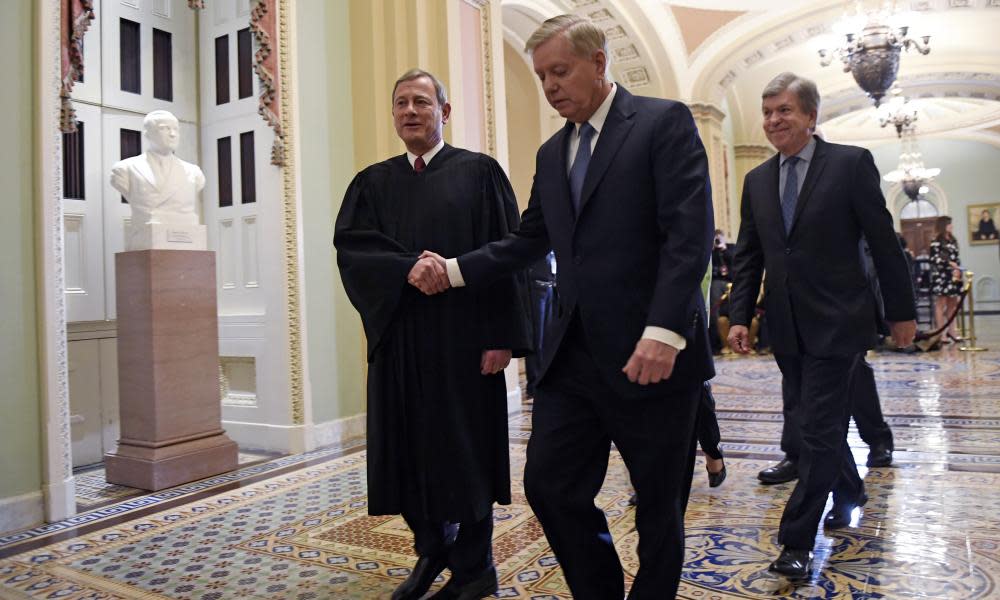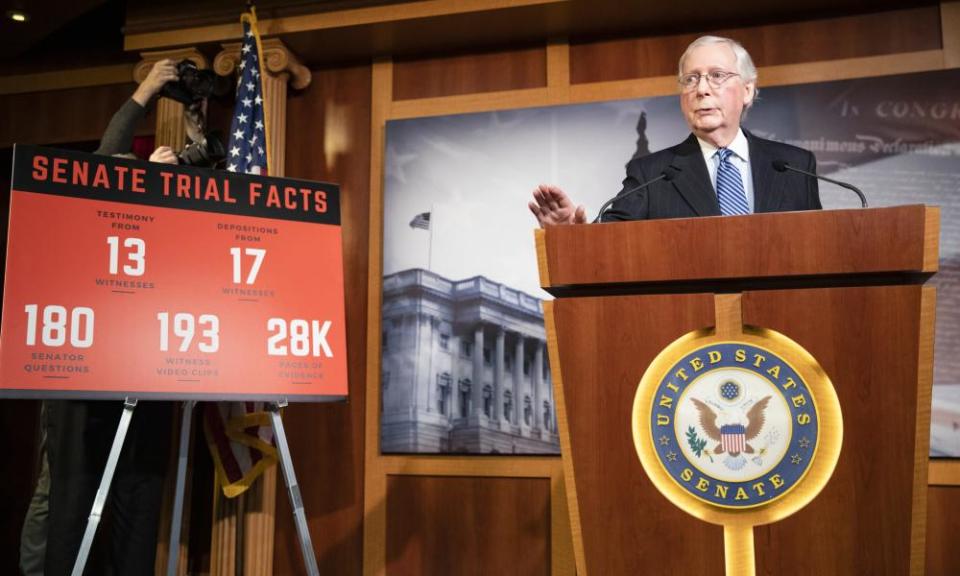Impeachment vote lacked suspense but weight of moment was still felt

One by one, they rose in the hushed Senate chamber and pronounced the words heard for centuries in courtrooms all over the world: guilty, or not guilty.
No, there was not the same suspense over the outcome as in the OJ Simpson murder trial, or when a jury foreman takes a deep breath in countless fictional courtroom dramas.
Even so, after all the acrimony, speculation and partisan games over the past six months, the weight of the moment made itself felt on Wednesday as US senators gravely voted on two articles of impeachment against Donald Trump.
Related: The great escape: how Donald Trump survived impeachment
It was only the third time in history that a president has been put on trial in such a way. And like Andrew Johnson and Bill Clinton before him, Trump was acquitted and allowed to remain in office.
“Senators, how say you? Is the respondent, Donald John Trump, guilty or not guilty?” asked Chief Justice John Roberts, wearing spectacles and black legal gown, hands pressing on pages of text from which he read. “A roll call vote is required. The clerk will call the roll.”
First up in alphabetical order was Senator Lamar Alexander of Tennessee, a protege of former senator Howard Baker, who famously asked during the Watergate hearings: “What did the president know, and when did he know it?”
Alexander, however, has proved himself terminally incurious in recent days. “Not guilty,” he said, rising from his desk. And so the die was cast.
Senator after senator followed with those visceral words. “Guilty” said Democrat Tammy Baldwin. “Not guilty,” said Republican John Barrasso. “Guilty,” said Democrat Michael Bennet. “Not guilty,” said Republican Marsha Blackburn. “Guilty,” said Democrat Richard Blumenthal. “Not guilty,” said Republican Roy Blunt. “Guilty,” said Democrat Cory Booker.
Some of the faces and voices were instantly recognisable. “Guilty,” said Democratic presidential candidate Bernie Sanders of Vermont. “Guilty,” said Elizabeth Warren of Massachussetts. Amy Klobuchar of Minnesota, who like them had sped back from campaigning in New Hampshire, seemed more eager than most. She was on her feet well before her named was called. “Guilty,” she answered crisply.

Republicans were almost equally consistent in their “not guilties”. The words were uttered Ted Cruz of Texas and Marco Rubio of Florida, men whose souls were crushed by Trump in the 2016 Republican primary. But there was a striking exception. Mitt Romney of Utah rose to his feet and pronounced the word “guilty”, becoming the the first senator in history to vote to convict a president of his own party.
Earlier, before a near empty chamber, Romney had explained: “Corrupting an election to keep oneself in office is perhaps the most abusive and destructive violation of one’s oath of office that I can imagine.”
Later, Senator Lindsey Graham had blasted back: “So, acquittal will happen in about two hours, exoneration comes when President Trump gets re-elected because the people of the United States are fed up with this crap.”
Romney was the only break from party lines. Democrats Joe Manchin of West Virginia and Kyrsten Sinema of Arizona, both seen applauding Trump enthusiastically at Tuesday’s State of the Union address, nevertheless stayed loyal to their side of the aisle.
When the sums were done for article 1, which charges that Trump abused the presidency by soliciting the interference of a foreign power – Ukraine – to benefit himself in the 2020 election, he had prevailed by 52 votes to 48, well clear of the two-thirds majority required to convict him. The tally on article 2, obstruction of Congress, was 53-47.
The Senate majority leader, Mitch McConnell, and minority leader, Chuck Schumer, facing Roberts like lawyers for the defence and prosecution, were less surprised than anyone. Before the votes, each had delivered speeches that were not so much closing arguments as notes to posterity, a battle in the court of history between two irreconcilable viewpoints.
Alleging a “a great miscarriage of justice” by a “kangaroo court” that refused witnesses and documents, Schumer said: “Our nation was founded on the idea of truth, but there was no truth here. The Republican majority couldn’t let the truth into this trial. The Republican majority refused to get the evidence because they were afraid of what it might show.”
With Democrats listening intently but Republican seats almost entirely empty, he continued: “Our nation was founded on the idea of truth, but in order to countenance this president, you have to ignore the truth.”
When Schumer offered a consoling message to the American people, “Don’t lose hope”, a wry smile played on McConnell lips. The majority leader soon offered a very different worldview, accusing Democrats of a rushed and partisan investigation that threatened institutions.

McConnell turned his fire on the House speaker, Nancy Pelosi, the original architect of impeachment, who on Tuesday ripped up her copy of Trump’s State of the Union address on national television.
“The speaker says she will just refuse to accept this acquittal,” McConnell said. “Perhaps she will tear up this verdict like she tore up the State of the Union address.
“I would ask my distinguished colleagues across the aisle: is this really where you want to go? The president isn’t the president? An acquittal isn’t an acquittal? Attack institutions until they get their way? Even my colleagues who may not agree with this president must see the insanity of this logic. It’s like saying you’re so worried about a bull in a china shop that you want to bulldoze the china shop to chase it out.”
Apart from Trump and McConnell, there were two winners of the impeachment trial. First, founding father Alexander Hamilton took the prize for most quoted historical figure, including several times on Wednesday alone. Can a Ouija board be found to divine his verdict?
Second, there was Roberts, who escaped any significant controversies and received bipartisan thanks – and a commemorative “golden gavel” - at the end. “You have been generous hosts,” he said, wrapping up, “and I look forward to seeing you again in happier circumstances.” Or, perhaps, in the same circumstances in 2021 or 2022?

